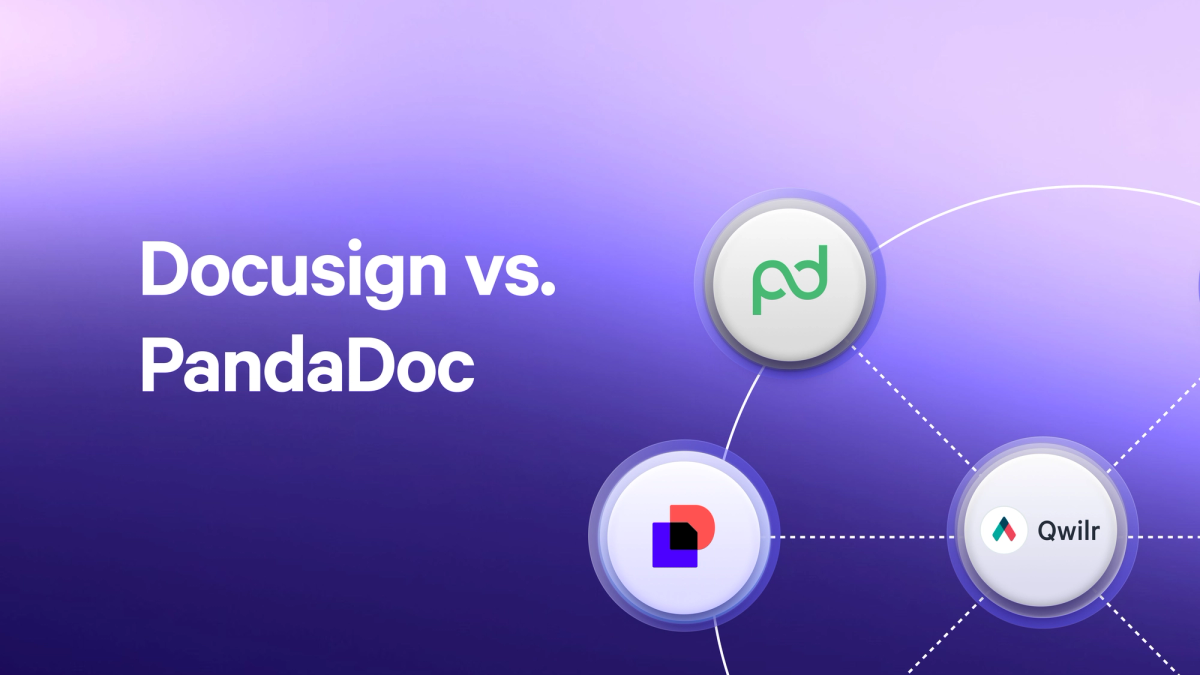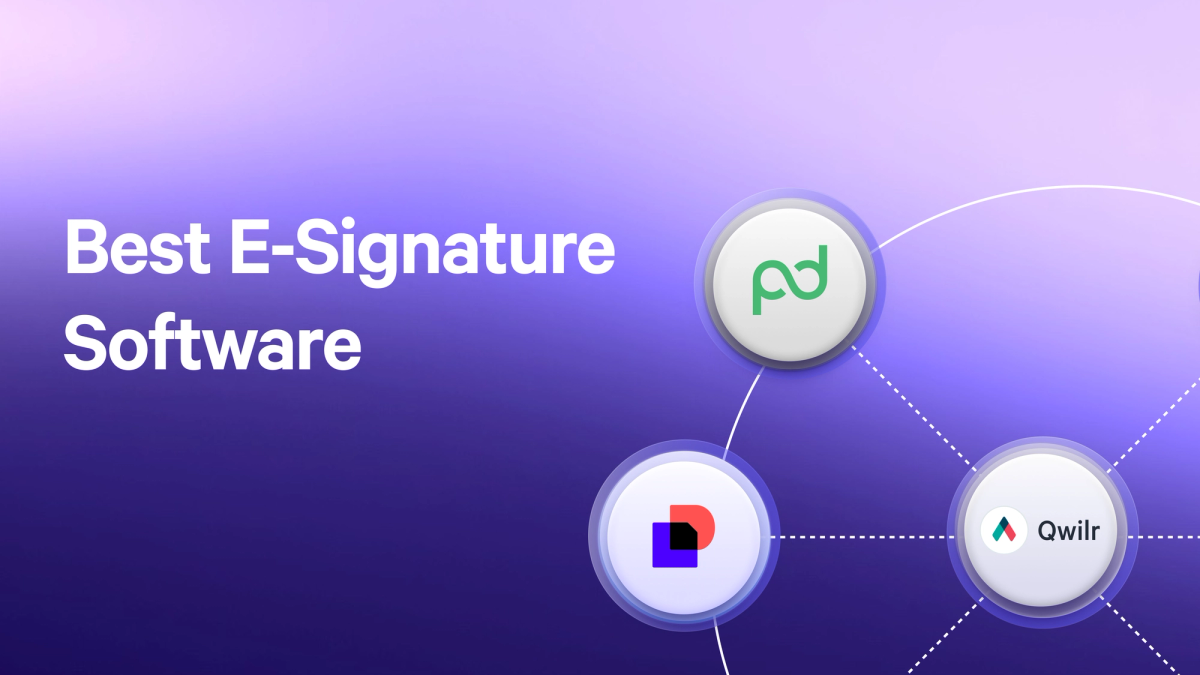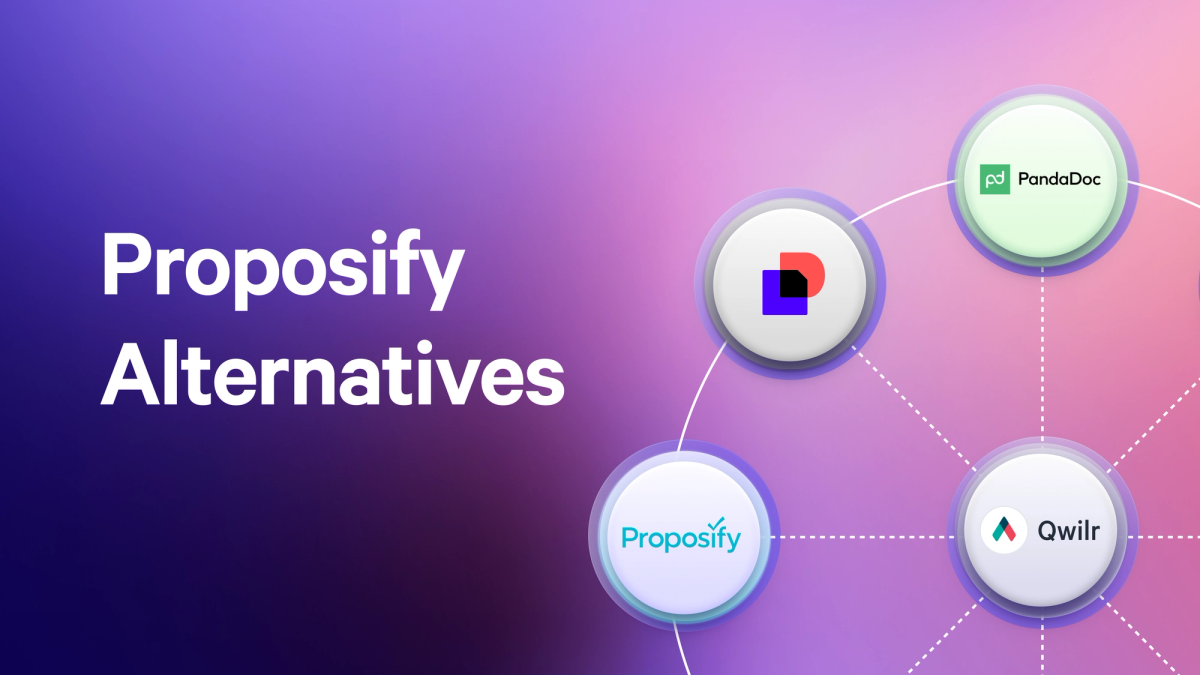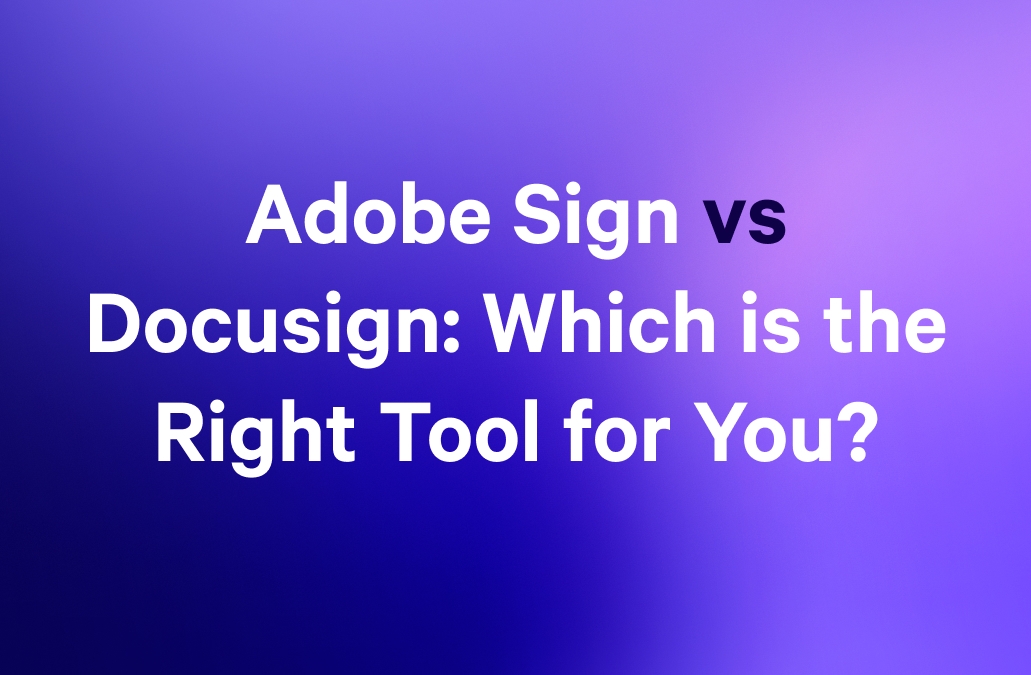Choosing the right e-signature platform can significantly impact your workflow efficiency, security compliance, and customer experience—especially as more business transactions move online.
Docusign is one of the most well-known players in the space, offering a wide range of plans and features tailored to individuals, growing teams, and large enterprises. But with pricing that scales quickly based on usage and functionality, you might be wondering: is Docusign worth the cost? In this article, we break down Docusign’s pricing tiers, explore what it does well (and where it falls short), and compare it to modern alternatives like Qwilr to help you make a more informed decision.
Key Takeaways
- Docusign offers multiple plan types, including Personal, Standard, Business Pro, and custom options.
- The Personal plan suits individuals with low-volume needs, while Business Pro and above are better for teams needing features like bulk send and payment collection.
- The Business Pro plan includes integrations with major CRMs like Salesforce and access to advanced workflow automation.
- Only custom or Advanced Solutions plans include full IAM capabilities and advanced identity verification tools.
- Developer access via API is available through a separate Developer plan, with advanced functionality limited to higher tiers.
Docusign pricing and features
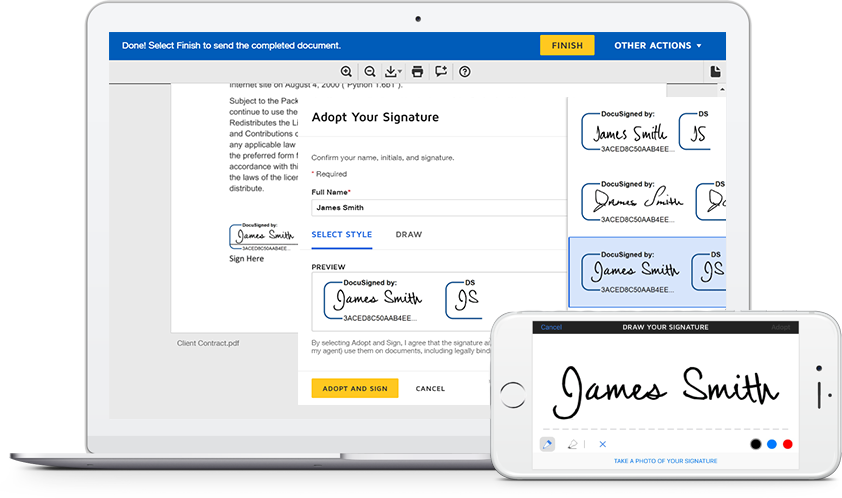
Docusign offers a diverse set of pricing plans tailored to meet the needs of various industries, team sizes, and technical requirements. Their standard plans—Personal, Standard, Business Pro, and Enhanced Plans—cover the basics of electronic signatures and scale up to include advanced features like bulk sending, payment collection, and workflow automation. For companies building custom integrations, Docusign provides a Developer Account with free sandbox access, API documentation, and tools designed to support embedded signing and agreement automation within your own applications.
Specialized plans are also available for industry-specific use cases. The Real Estate plan, for example, includes features geared toward agents and brokers, such as pre-built forms and access to the National Association of Realtors® (NAR) libraries in the U.S. Meanwhile, for larger organizations with strict identity and compliance requirements, DocuSign offers Identity & Access Management (IAM) solutions under their Advanced Solutions umbrella.
E-signature Plans
Personal
Cost: $15/month billed monthly; $10/month billed annually
Best for: Individuals & sole proprietors
Features:
- 5 envelopes for e-signature / month
- Signing workflow with basic features
- Audit trail
- Notifications & reminders
- Mobile-responsive signing
- Templates
- 900+ integrations
Standard
Cost: $45/month/user billed monthly; $25/month/user billed annually
Best for: SME teams
Features:
- 100 envelopes per user / year
- Collaborative commenting
- Scheduled sending
- Pre-filled fields
- Value calculator
- User & group permissions
- Shared templates
- Team reports
Business Pro
Cost: $65/month/user billed monthly; $40/month/user billed annually
Best for: Automating and optimizing agreements
Features:
- Locked templates
- Drawing fields
- Payment collection
- Signatory attachments
- Bulk send
- Envelope custom fields
- Web forms
E-signature Real Estate Plans
Real Estate Starter
Cost: $15/month billed monthly; $10/month billed annually
Best for: Basic e-signature needs
Top features:
- 5 envelopes/month
- Mobile app
- Strikethrough
- Audit trail
- Notifications & reminders
- Mobile-responsive signing
- Templates
Real Estate
Cost: $45/month/user billed monthly; $25/month/user billed annually
Best for: Advanced feature usage
Top features:
- Customized branding
- Collaborative commenting
- Signatory attachments
- Drawing fields
- Payment collection
- Signatory attachments
- Bulk send
Developer API
Starter
Cost: $75/month billed monthly; $50/month billed annually
Best for: Basic building
Features:
- API usage center
- Software development kits
- Mobile software development kits
- E-signature core features
Intermediate
Cost: $450/month billed monthly; $300/month billed annually
Best for: Improving integration with more features
Features:
- Collaborative commenting
- Customized branding
- Scheduled sending
- E-signature core features
Advanced
Cost: $720/month billed monthly; $480/month billed annually
Best for: Premium solution
Features:
- Bulk send with e-signature REST API
- Custom mobile experience with elastic signing
- PowerForms for API
Intelligent Agreement Management + E-signature Plans
IAM Starter
Cost: $65/month/user billed monthly; $40/month/user billed annually
Best for: Individuals who need to manage agreements with AI.
Features:
- 100 envelopes per user per year
- 1 Maestro workflow
- AI-assisted data extractions
- Collaborative commenting
- Pre-filled fields
IAM Standard
Cost: $75/month/user billed monthly; $45/month/user billed annually
Best for: Teams managing agreement workflows, with a repository and AI.
Features:
- Unlimited web app sends
- 3 Maestro workflows
- Navigator agreements#: additional 500 agreements per user per year
IAM Professional
Cost: $95/month/user billed monthly; $75/month/user billed annually
Best for: Teams managing end-to-end agreement workflows
Features:
- Unlimited web app sends
- 10 Maestro workflows
- Bulk send
- Payment collection
- Multi-channel delivery
- Single sign-on (SSO)
- Web Forms
Docusign Enhanced Plans: For high-volume, high-control needs
Docusign’s Enhanced Plans are designed for businesses that require advanced customization, administrative control, and support for complex workflows.
These plans go beyond what’s offered in the standard Business Pro tier, unlocking capabilities like single sign-on (SSO), custom branding at scale, advanced user management, and deeper reporting and analytics. They're best suited for larger organizations or regulated industries that need strict governance, internal compliance tools, and enterprise-level security.
Enhanced Plans are often fully customizable, with pricing and features tailored to each business through direct consultation with Docusign’s sales team. While these plans deliver powerful tools and support, they typically come at a premium—making them ideal for companies that rely heavily on digital agreement workflows and need complete control over how they’re managed, deployed, and tracked.
What does Docusign do well?
Docusign has built a strong reputation for doing the core of electronic signatures exceptionally well. It’s widely praised for its ease of use, with a clean interface that makes it simple for both senders and signers to complete agreements quickly.
Verified users on G2 consistently mention how intuitive the platform is, which reduces friction in the signing process—especially helpful when working with clients or external stakeholders who aren’t tech-savvy.
Docusign also scores high marks for security and compliance, offering robust encryption, detailed audit trails, and adherence to international e-signature laws like ESIGN, UETA, and eIDAS. This makes it a trusted choice in industries like finance, healthcare, and legal, where data protection and regulatory compliance are critical.
Beyond that, Docusign integrates smoothly with more than 400 applications, including big players like Salesforce, Microsoft, Google Workspace, and SAP. These integrations allow businesses to automate workflows and reduce manual document handling—something many users on TrustRadius say has saved their teams hours of administrative work. And for enterprise customers, features like bulk send, conditional fields, and advanced recipient routing help manage complex signing scenarios with ease.
Where could Docusign do better?
While Docusign excels in signatures and document handling, it falls short when it comes to visual design flexibility and post-signature engagement tools. The platform’s document customization options are relatively limited—users on Capterra and G2 often mention frustration with the lack of design control, particularly when creating client-facing materials that need to reflect brand identity.
Elements like layout customization, interactive content, or dynamic pricing tables aren’t native to Docusign and usually require workarounds or external design tools.
Another area where users say Docusign could improve is in its analytics and content-level tracking. While the platform offers status updates and basic activity logs, it doesn't provide deeper insights into how recipients engage with content—such as which sections are viewed most or where they drop off.
Several reviewers have noted this as a drawback, especially for teams looking to refine their sales or proposal workflows based on engagement data. Additionally, advanced features like multi-language support, team collaboration within the document, or tailored proposal templates are either limited or buried in higher-tier plans, making them less accessible to smaller teams or early-stage businesses.
Looking for better options? Check out our guide to 10 Best Docusign Alternatives in 2025
Is Docusign worth the cost?
For many businesses, Docusign is worth the investment. It’s known for its top-tier security, easy integrations with tools like Salesforce and Google Workspace, and features that save time—like automated reminders and real-time audit trails. According to a Forrester study, companies using Docusign saw a 127% return on investment over three years, thanks to faster deal cycles and less manual work. Plenty of users on sites like G2 and Capterra praise it for simplifying document workflows and helping them stay compliant, especially in industries with strict regulations.
That said, whether Docusign is worth the price really depends on your team’s needs. It’s one of the more expensive e-signature platforms out there, and many users on TrustRadius and G2 have pointed out that features like bulk sending or custom branding are only available on higher-tier plans.
If you’re a small business or just need basic signing capabilities, you might find more affordable alternatives like Dropbox Sign or Adobe Acrobat Sign offer better value. Some users even mention switching after realizing they were paying for features they rarely used.
Docusign, but sexier: Qwilr
Qwilr is a strong alternative to Docusign for businesses looking to go beyond signatures and elevate the entire proposal experience.
While Docusign is primarily built for secure document execution, Qwilr focuses on the full lifecycle of client-facing documents, making it especially valuable for sales teams that want to close deals faster and leave a lasting impression. With Qwilr, you’re not just sending a PDF to be signed; you’re delivering a polished, interactive web page that reflects your brand, showcases your offering, and enables action, whether that’s accepting a quote, scheduling a call, or paying an invoice.
Qwilr’s intuitive editor makes it easy to build visually engaging proposals using pre-built blocks, interactive pricing tables, and embedded multimedia like video explainers or product demos.
Real-time analytics give teams detailed insights into how prospects engage with each section of a proposal, helping inform more personalized follow-ups. Qwilr also integrates directly with CRMs like HubSpot and Salesforce, automating proposal creation based on deal data to save time and reduce manual errors. For teams that want more than just a signature—who care about design, buyer experience, and conversion, Qwilr offers a modern, user-friendly alternative that helps proposals sell themselves.
Find out more here: Qwilr vs Docusign
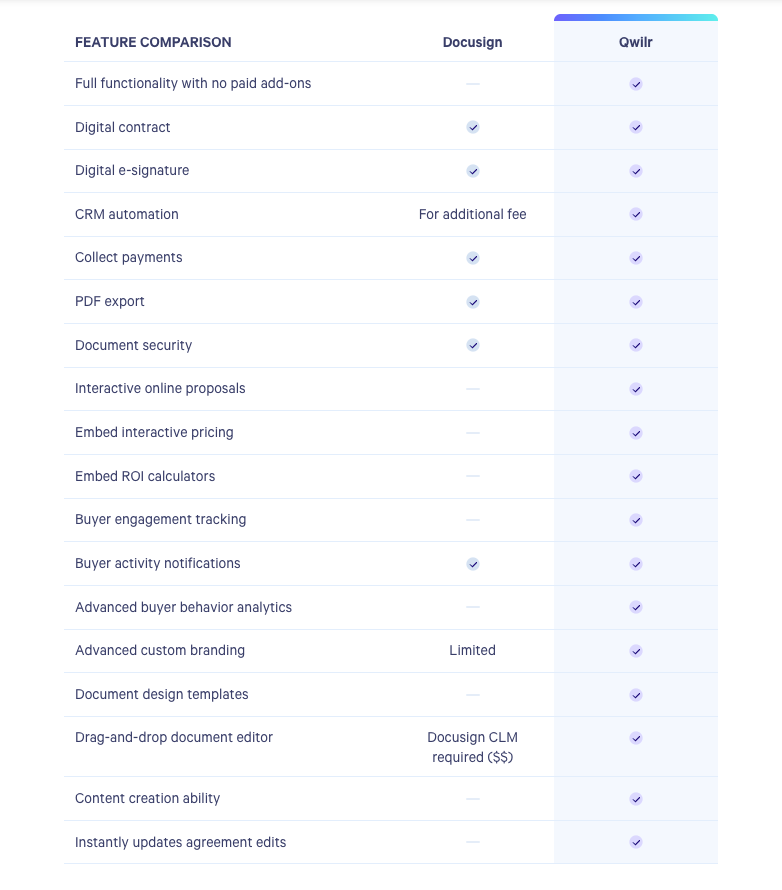
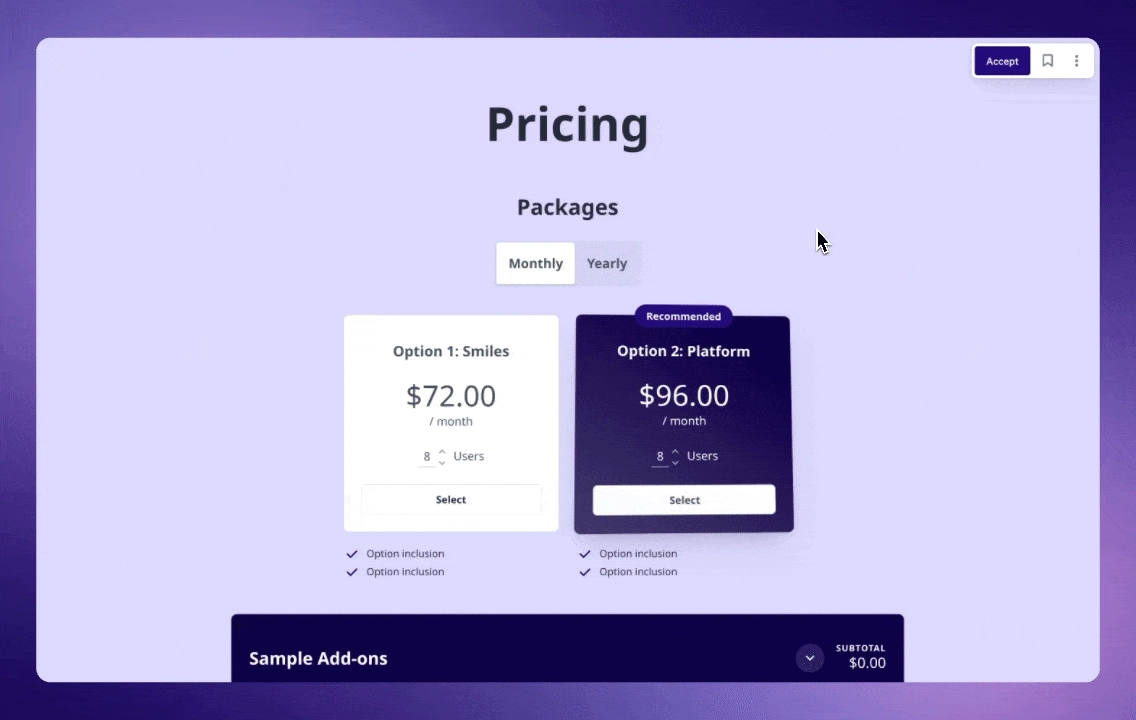
About the author

Brendan Connaughton|Head of Growth Marketing
Brendan heads up growth marketing and demand generation at Qwilr, overseeing performance marketing, SEO, and lifecycle initiatives. Brendan has been instrumental in developing go-to-market functions for a number of high-growth startups and challenger brands.
